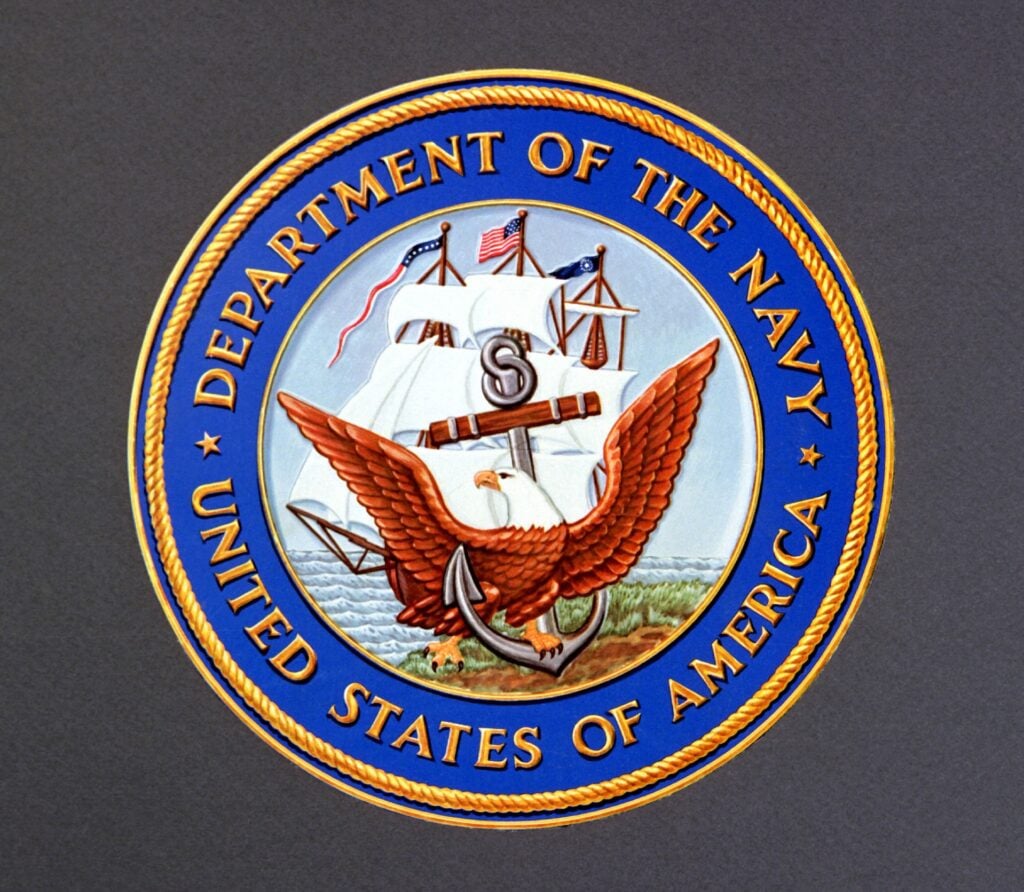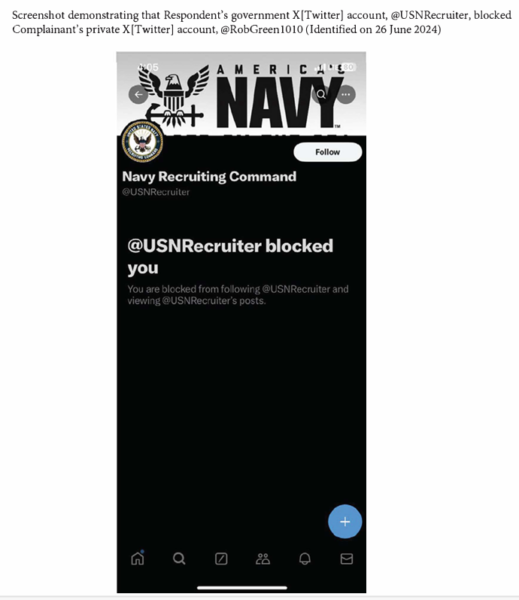We support our Publishers and Content Creators. You can view this story on their website by CLICKING HERE.

On January 1, Navy Cmdr. Robert A. Green, Jr., publicly shared an open letter that that seeks accountability over the harm caused by the Department of Defense’s (DOD) implementation of the now-rescinded COVID-19 vaccine mandate.
Over 35,000 people have joined the original 231 signatories of the letter by signing a petition that accompanies the Declaration of Military Accountability.
Six months later, on July 1, the author of Defending the Constitution Behind Enemy Lines, has now filed a formal complaint against the Admiral in charge of Recruiting for the Navy. In a pair of X posts this morning, readers can find Cmdr. Green’s “OBJECTION TO SETTLEMENT AGREEMENT AND RELEASE OF ALL CLAIMS In U.S. Navy SEALs v. Biden.”
Don’t let the Navy off the hook with a mild tap on the wrist. This is the first case in our lifetimes that could altar the tradition of court deference to the will of tyrannical military commanders.
Don’t let this suit settle. The fight for #militaryaccountability must go on! https://t.co/7cpCJwGNTu
— Chase Spears (@DrChaseSpears) July 2, 2024
Within his complaint, Cmdr. Green alleged the “unlawful deprivation” of his First Amendment rights granted by the Constitution and a violation of 42 USC § 1983.
The complaint specifically identifies Rear Admiral James P. Waters, the commander of Navy Recruiting Command. On June 26, Navy Recruiting Command blocked Cmdr. Green from commenting on its official social media account hosted by X, formerly known as Twitter.
Speaking as a citizen of the United States who emphasizes that his views do not reflect those of the Department of Defense or Department of the Navy, Green often criticizes the Navy’s unlawful participation in the now-rescinded 2021 military COVID-19 shot mandate. For him, the mandate had a severely negative impact on recruiting and force readiness.

The Gateway Pundit spoke with former U.S. Army public affairs officer Dr. Chase Spears, who agrees with Cmdr. Green as evident by his reply to the Navy commander’s X post. Having served in the public affairs career field for 20 years, Dr. Spears acknowledged “witnessing a debate in the public affairs realm about whether or not commands can, and should, block users.” Traditionally, he said, the First Amendment awarded a layer of protection to service members commenting in a personal capacity on various social media platforms.
“There are basic rules of engagement that allow those who manage official military social media accounts to hide or delete comments that are profane or obscene, that violate people’s privacy or call for violence against anyone,” he said, explaining that “Americans nevertheless have the right to comment on and even criticize official government messaging.”
However, in recent years, management of official military social media accounts has “gone through an evolution, becoming more Orwellian in practice,” Dr. Spears shared. While Americans should continue to have the right to engage and debate official military talking points, he said, “People who differ from the party line are increasingly being viewed with a sense of reprobation by those who run military social media accounts.” This, he said, is “changing the previously understood rules of military social media engagement.”
According to Dr. Spears, “the debate has moved farther away from protecting the rights of what people have to say on the social media platforms, particularly when they’re addressing a government account.”
“There’s a much more progressive mindset among commanders and public affairs officers (PAO),” he said. “They don’t want people hijacking their messaging, criticizing their messaging, or giving a reason for people to doubt their messaging—so if they don’t like what someone has say, they’re increasingly open to hiding comments or even blocking a critical user’s account.”
In the latter part of his career as a PAO, Dr. Spears noticed that in the military public affairs fields of practice, “those who have a constitutional perspective [that protects free speech] are finding themselves outnumbered, or at least outgunned in terms of authority and influence.” And those who take a censorious approach, he said, “believe it’s fair and ethical to block users and delete the comments that go against their narrative.”
According to him, “their actions [against Cmdr. Green] are a violation of the operating doctrine of the Defense Department, which is maximum disclosure, minimum delay.” As Cmdr. Green pointed out in his formal complaint, the Supreme Court case O’Connor-Ratcliff v. Garnier confirmed that “the deprivation of a citizen’s first amendment rights from a government-controlled social media account is not permitted under law.”
“Case law is clearly on Cmdr. Green’s side,” Dr. Spears explained. “Bottomline, the legal, ethical practice should be that you don’t block people for saying something merely because you or your commander doesn’t like it. That undermines the Constitutional purpose of what the military exists to protect.”
A History of Violating Constitutional Rights
Dr. Spears noted that commanders, like Rear Admiral Waters, are responsible for everything that happens in their organization. “However,” he pointed out, “they’ll often avoid issues that might violate policy, principle, or even the Constitution to keep from rocking the boat.”
One such issue that is noted by Cmdr. Green in his Article 1150 complaint was related to the 2021 COVID-19 shot mandate:
“Under Rear Admiral Waters’ watch, the OPNAV N131 Religious Accommodation Review Team developed and executed a Standard Operating Procedure (SOP) to issue a template denial to each Religious Accommodation Request submitted by Navy sailors without doing the individualized review required by law and military regulation.”
Furthermore, “The actions taken by Rear Admiral Waters and his team were so flagrant that they became the cornerstone evidence in the SEALs v. Biden federal lawsuit over religious liberty in the United States Navy.”
Dr. Spears noted that “this fits the model we have seen of flag officers across the Department of Defense.” He explained, “They have not been held accountable for their actions, forcing the injection and violating people’s religious rights.” Despite their tyrannical enforcement of an ineffective “vaccine,” he pointed out, “none of them were demoted, and none of them were fired, but many of them were promoted.”
“What does that tell everyone else beneath you?” he asked. “It sends a powerful message that if you want to get promoted, if you want to have higher levels of command, you need not worry about what the law says, but rather worry about what your higher command tells you to do.”
“Americans have to ask themselves, is this the kind of military leadership that you want?” Dr. Spears asked in conclusion.
The Gateway Pundit also spoke to Coast Guard Vice Admiral (ret.) William “Dean” Lee. Although he elected to take the shot, VADM Lee considers himself “in lockstep” with Cmdr. Green. “I took it because I trusted it,” he said. “That trust is now lost, [and] the heavy-handed manner in which the mandate was executed is shameful.”
“Once it was discovered that vaccinated service members were still getting COVID and the country had already gotten past the curve of the pandemic because everyone had pretty much had it already,” he said, “it is then that leadership failed to take a strategic pause to reflect and ascertain whether enforcement of the vaccine was still a good idea.”
What’s more, he said, “leadership continued to stick to their guns even with all the publicity and emergence of facts about the side effects exacerbated, if not caused, by the vaccine itself.”
Regarding Rear Admiral Waters, VADM Lee said, “I don’t know what was in his mind at the time, but I do know this … disobeying an order or going against the grain of what the institution wants to do doesn’t bode well for members of the military, but those few that are willing to stand their ground on principle, such as Commander Green, are admirable.”
VADM Lee asserts, “Current leadership needs to examine what went right, and what went wrong here.” According to him, “They have a duty of care to go back and review every process, every policy, and every decision made during the COVID-19 roll-out and ask themselves what could have been done better.”
“This wasn’t about a shot. This was about much more than that,” he argued. “It was about truth, trust, and a government unwilling to admit that this could have been handled far better.”
“If I were still on active duty, I would want to know the answer to these things. Let us endeavor not to make the same mistakes again,” said VADM Lee.

 Conservative
Conservative  Search
Search Trending
Trending Current News
Current News 


